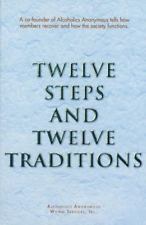
"Every A.A. group ought to be fully self-supporting, declining outside contributions."

 |
Tradition Seven "Every A.A. group ought to be fully self-supporting, declining outside contributions." |
 |
"Alcoholics are certainly all-or-nothing people. Our reactions to money prove this. As A.A. emerged from its infancy into adolescence, we swung from the idea that we needed vast sums of money [a likely reference to the grandiose projects mentioned in Tradition Six] to the notion that A.A. shouldn’t have any." (Page 161) The new, cautious attitude toward money came about after some members attempted to cash in on connections in the fellowship and some outside donors sought to influence A.A. affairs. Money even threatened the unity envisioned in the First Tradition: "One A.A. group was given five thousand dollars to do with what it would. The hassle over that chunk of money played havoc for years." (Page 161)
A middle ground had to be found between these two extremes. Expenses were unavoidable for meeting places and offices, staff and phones to handle calls for help. The author cites the tremdous imapct of the 1941 Jack Alexander Article in the popular Saturday Evening Post as greatly increasing the need for financial means to manage the rapidly expanding interest in A.A.
The author shares at some length his own experience with an unhealthy use of money, and the lesson learned. After having given a large personal handout to a none-too-successful sponsee, he then proceeded to drop a single thin dime into the group hat instead of the "folding money" that was needed to ease the financial straits of the local A.A. club. "I realized that my five-dollar gift to the slippee was an ego-feeding proposition, bad for him and bad for me. There was a place in A.A. where spirituality and money would mix, and that was in the hat!” (Page 163)
Later, in 1948, the Alcoholic Foundation (precursor to the General Servie Office as it is known today) was bequeathed a large sum of money, prompting serious discussion. The Foundation was in need of the money,as finacial support from A.A. groups was lacking. Opponents of accepting the bequest pointed out that there were other large sums of money known to be earmarked in other people's wills for A.A. What if the Foundation did eventually receive these sums? "Whoever pays the piper is apt to call the tune, and if the A.A. Foundation obtained money from outside sources, its trustees might be tempted to run things without reference to the wishes of A.A. as a whole." (Page 164) The money was declined after some discussion. As the author wrote in Step Twelve, "Money gradually became our servant and not our master." (Page 122) A result of this episode was setting of a precedent that has enhanced confidence in A.A.'s integrity, a precedent generally followed by A.A. groups to this day:
Then our trustees wrote a bright page of A.A. history.
They declared for the principle that A.A. must always stay
poor. Bare running expenses plus a prudent reserve would
henceforth be the Foundation’s financial policy. Difficult
as it was, they officially declined that ten thousand dollars,
and adopted a formal, airtight resolution that all such fu-
ture gifts would be similarly declined. At that moment, we
believe, the principle of corporate poverty was firmly and
finally embedded in A.A. tradition. (Page 165)